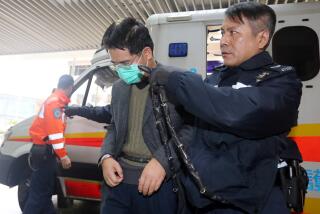Family Suicide-Homicide a Tragic Trend in Taiwan
- Share via
TAIPEI, Taiwan — Three days after he was diagnosed with liver cancer, Lin Wen-piao mixed a deadly dose of pesticide with milk and yogurt and fed it to his young son and two daughters before drinking some of the mixture himself.
Splashed across the island’s front pages, their deaths a few weeks ago shocked Taiwanese. Many sympathized with the 52-year-old unemployed construction worker in the southern city of Kaohsiung, although they were puzzled that he killed his children, ages 3, 6 and 7, instead of leaving them to his wife, who supported the family with her job at an electronics factory.
Yet some health experts viewed the deaths as part of a trend. Although Taiwan is seeing an increase in family suicide-homicides, such tragedies stopped being oddities long ago in other parts of Asia, notably Japan.
Physicians and social workers say mental illness plays a big role, but societal changes and the region’s long-held beliefs about parental duties are also factors.
In a new study, physician Chang Chi-ming said 78 family suicides were reported in Taiwan over the last decade -- 40 of these occurring in the last three years. No figure is available yet for 2003.
“A few killed the children to make their surviving spouses deplore the rest of their lives, and others believed taking the children along when they commit suicide would be the best choice for the kids,” Chang said.
Chang drew his information from news reports that included details from suicide notes and comments from family members. Police records aren’t open to the public.
In a recent case in Taipei, the capital, a man apparently distressed over his wife’s demand for a divorce forced his teenage daughter and son to swallow sleeping pills. The 44-year-old security guard, Su Feng-chi, then ignited gas and set their house afire. He died, but firefighters were able to rescue his children, who suffered serious burns.
One of Taiwan’s most bizarre cases occurred in September 2001 and involved a wealthy couple in the central county of Changhua who had a large incinerator installed in their luxurious villa.
Police found ashes and bone fragments from the couple’s three children, ages 19 to 24, next to the incinerator. The badly burned bodies of the parents were found inside.
Before getting in, the couple had removed their slippers and arranged them neatly outside the incinerator door, police said. They left a note complaining about Taiwan’s unstable political situation and expressing a wish to “leave this ugly world behind,” police said.
Wang Yu-min, an executive at Taiwan’s Children Welfare Assn., said some suicidal parents kill their children because of an Asian view that parents own their children.
“Many of our parents consider children their own property or subordinates,” Wang said. “They will live and die together with the children. It is a different way of showing parental love than in the West.”
Japan has a long history of family suicides, and they are common enough that they hardly make major headlines, said Mafumi Usui, professor of psychology at Niigata Seiryo University in Japan.
Statistics for such deaths are hard to come by because Japanese officials don’t track them. But Japan has special phrases for them: When an entire family commits suicide together, it’s called ikka shinju. When a parent kills the children before killing himself, it’s called muri shinju.
Usui said some parents are reluctant to leave their children behind because of the hardship that the children might face in a society that traditionally has looked down on orphans as having brought bad luck to their parents.
“Pity plays a big role,” he said. “They [the parents] think that it’s perhaps better off for the whole family to die together.”
Often, Asian society isn’t critical of such parents, he added. “People tend to sympathize with the parent who is undergoing such hardship to do something like that.”
Family suicides often occur in troubled marriages that offer spouses little support in difficult times, some social workers say. Such suicides involve mothers more often than fathers because women generally have fewer resources and are closer to their children, they say.
Although democracy has taken root in many Asian countries, family suicides appear to be remnants of age-old traditions that required absolute obedience to parents or superiors.
“In Taiwan, adults have learned to fight for their self-interests when their own rights are invaded, but few children stand up to confront their abusive parents,” said Wang at the Children Welfare Assn.
Some experts attribute Taiwan’s increase in family suicides to rapid urbanization that has broken down closely knit social units. In the old days, nosy grandmothers, aunts and neighbors would intervene, the experts say.
Many parents who have recently moved to cities are reluctant to ask for help from non-relatives, said Chiang Hsin-hui, an official with Taipei’s Social Affairs Department.
“Taiwanese families are more closed up, and parents keep their problems to themselves,” she said.
Associated Press reporter Natalie Pearson in Tokyo contributed to this report.
More to Read
Sign up for Essential California
The most important California stories and recommendations in your inbox every morning.
You may occasionally receive promotional content from the Los Angeles Times.













